MLK Day

A favorite movie of mine growing up was the 1999 cartoon Our Friend, Martin. It combines two of the subjects I love most: time travel and Martin Luther King Jr. The main character, Miles, a Black sixth grader, visits the childhood home of King and ends up traveling back in time to meet King at various stages of his life. Miles, who was largely unaware of King before time traveling, eventually learns that King was assassinated. In order to prevent this, Miles convinces his new friend Martin to come to the future with him. And while that decision spares King’s life, the movie makes it clear that Miles saving his friend’s life would prevent the racial equality we now enjoy in the U.S.
In the modern U.S., are we really enjoying a post-King racial equality?
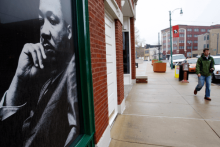
No Christian leader has influenced my faith and activism as much as Rev. Martin Luther King Jr. — but the day we devote to his legacy often leaves me frustrated. There’s a bitter irony in a nation that takes a day off to celebrate King’s life and work while that same nation is experiencing a deep backlash against racial justice.
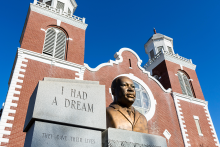
We can honor King’s vision by working to restore the voting rights that he knew were so central to dismantling racism in this country. As King proclaimed, “Voting is the foundation stone for political action.”
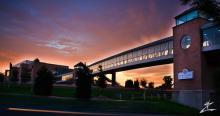
While long quietly politically engaged, many at the school have taken on a noticeably more public stance toward actions from the Trump administration.
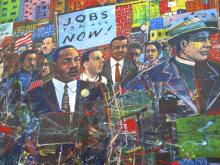
The relationship between a Southern Baptist black man and a Jewish mystic can teach us a lot today about how to work across divides, and how to become one in the face of hatred and racism.
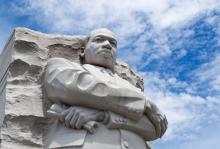
On the Friday morning before Martin Luther King Day this year I met nine twentysomething Sojourners interns at the Martin Luther King Jr. Memorial on the National Mall. We collected into a circle, and I told them: “This is sacred ground.” I explained that we would enter the grounds in silence. I instructed the mostly white group to spend 15 minutes examining the memorial — observe — see what they see. Then we would come back together and share what we saw.

If we see our interests and needs as more important than the interests and needs of others, then we’ll never have peace in our personal lives or in our world. Peace requires a recognition that we’re all equally beloved children of the same loving God.
It involves recognizing that we all matter equally — and then doing some introspection to see if we’re living up to it in our various relationships.

We live in a culture that not only glorifies violence, but often celebrates its use against the “enemy" as the truest form of heroism and bravery. While I won’t get into the debate of whether violence is ever justified to preserve life (a much bigger conversation extending far beyond an 700-word post), I will say I’m deeply troubled by our assumption that violence is the only way to respond to a real or perceived threat.

In cities and towns across our nation, this weekend’s coordinated actions for the #BlackLivesMatter movement center on reclaiming Martin Luther King Jr.’s radical legacy. As you may recall, Missouri Gov. Jay Nixon and President Barack Obama — among others — invoked the nonviolence of King in their calls for peace following the non-indictment of Darren Wilson. As Martin Luther King Jr. Day approached, organizers had to field countless criticisms by white people telling them, “King wouldn’t approve of what you’re doing” and “I’ve studied his work, I know he wouldn’t react like you have.”
Based on comments like these, it stands to reason that white people in the United States may need a jolt of reality about King’s anti-capitalist agitation.
King was outspoken against capitalism’s oppressive clutch on both the national and global levels. King made it clear that racism and economics were intimately intertwined. I’m reminded of his classic quote, “What good is having the right to sit at a lunch counter if you can’t afford to buy a hamburger?”
King acknowledged that the discussion of class couldn’t be divorced from the discussion of race. While both conversations make us uncomfortable, somehow we would rather remember King as a civil rights leader only, and not also as a vocal critic of capitalism who instead favored a form of Democratic Socialism.
I often hear criticisms that protesters are disturbing the peace, employing overly aggressive tactics, and generally making people too uncomfortable. The hypocrisy in these claims is that King disturbed the peace, used aggressive tactics, and made people extremely uncomfortable. Why do we call for peace when what we mean is order?
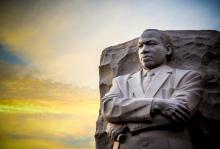
Week after bloody week, the chart of killings lengthens. And in Afghanistan, while war rages, a million children are estimated to suffer from acute malnourishment as the country faces a worsening hunger crisis.
Around this Martin Luther King, Jr. Day, we can and should remember the dream Dr. King announced before the Lincoln Memorial, the dream he did so much to accomplish, remembering his call (as the King Center asks) for nonviolent solutions to desperate concerns of discrimination and inequality within the U.S. But we shouldn't let ourselves forget the full extent of Dr. King's vision, the urgent tasks he urgently set us to fulfill on his behalf, so many of them left unfinished nearly 46 years after he was taken from us.
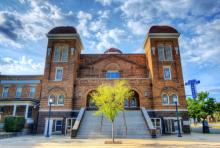
There is no question that our nation is currently deeply divided about a great many issues. In our effort to enshrine him, some may have lost sight that Dr. Martin Luther King Jr. too addressed a nation that was divided. With all the media focus on the 50th anniversary of the Kennedy assassination this past fall, the 50th anniversary of another great national tragedy received little notice. On September 15, 1963, white racists bombed the 16th Street Baptist Church in Birmingham, Ala., killing four young African-American girls who were attending Sunday school.
This Martin Luther King Day, the SALT project has created a short, inspiring film retelling the famous last four minutes of King’s, “I Have A Dream” speech. Enjoy!
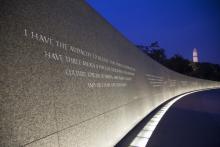
Prophets are always asking questions. Tough questions. Unsettling questions. Questions that they pose to themselves, then try to answer by how they live.
Questions such as:
What’s in our hearts? Are we concerned too much about ourselves and too little about others? Do we believe in love? Why do we give in so readily to bitterness and hatred?
Why do so few have so much, while so many have so little? Aren’t we all diminished by the poverty, discrimination, violence, and the various injustices in our world? Why do we glamorize violence and weapons as solutions to our problems?
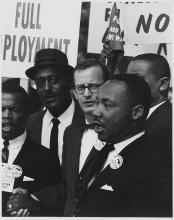
If the latest Billboard album chart is anything to go by, the answer to Victor Hugo’s question “Do you hear the people sing”? is a resounding “Yes!” as the soundtrack to the latest film adaption of his novel has hit number one. More ambiguous however, is the answer to the question: do we understand what they are singing?
Many know of Dr. Rev. Martin Luther King Jr.’s “Letter from a Birmingham Jail.” Fewer know of Dr. King’s letter from a Selma jail where he wrote, “If we are to achieve a real equality, the U.S. will have to adopt a modified form of socialism.” This week will see President Obama sworn into office by laying his hand upon the Bible of America’s greatest preacher and prophet, M.L. King. If the appropriateness of King’s radical legacy being invoked by Obama goes beyond being skin deep, might we also ask the question: do we hear and understand the song Martin King sung?
As many blogs will brim with praise for Martin Luther King, Jr., with little mention of his politics, so too are they awash with praise for the latest Les Misérables film without mention of its vision for society. They praise Hugh Jackman and Anne Hathaway’s ability to blubber while beautifully belting out ballads. They have shown the Christian virtue of mercy to Russel Crowe’s singing (at least more mercy than the infamous critique of his musical ability by Australian punk band Frenzal Rhomb). All this before moving on to talk of Les Misérables’ less-than-subtle Christian themes.
As CNN reported, since the micro-targeted marketing success of movies like The Passion of the Christ, film studios have been courting Christians to exchange their pews for popcorn and Gospel songs for cinema going. Again, this time with Les Misérables, the faithful have responded to the box office like it was an altar call offered with Dr. King’s eloquence.

Violence does not equal power.
Martin Luther King, Jr., understood this. Yesterday was King’s 84th birthday. This year the national holiday to honor him will coincide with President Barack Obama’s second inaugural ceremony. And, all of this happens in the wake of one of the worst mass shootings in the nation’s history. One month after the shootings at Sandy Hook Elementary School in Newtown, Conn. — which left 20 children and six adults dead, plus the killer’s mother, found dead in her home — the country grapples with the issue of gun violence. If the country is to come to consensus on the issue, we will have to distinguish between violence and power.
Vice President Joe Biden gave recommendations to the president regarding gun safety on King’s birthday. The questions the media are asking already abound: What recommendations can the president implement through executive order? Can an assault weapons ban pass Congress? Will victims and gun safety advocates be able to persuade Congress to pass meaningful legislation?
There will be varying interpretations of the Second Amendment, and there will be some who will argue that guns are necessary for self-defense. We will have the discussion as to whether or not the gun culture in the United States has taken on religious proportions.
Have you ever heard of healing prayer?
Richard Foster writes about it in his seminal book, Prayer: Finding the Heart’s True Home. Healing prayer is different than prayers of supplication or intercession — the kind of prayer where we get to ask God for stuff. It’s different from contemplative prayer — the kind where we get to sit and soak in the presence of God.
Healing prayer goes deep into the soul of the prayer with one purpose — to heal hearts and souls broken by life. In healing prayer, the one on their knees invites Jesus to go deep — to reveal core lies she or he has believed about themselves, God, the world, their relationships; to identify the point when that lie took root in the soul; and then to renounce the lie and invite in the truth.
I was in the middle of my second year as a volunteer staff member with Intervarsity Christian Fellowship in 1996, when I had my first experience of healing prayer. It was a hard year for various reasons, so a good friend offered to pray for me. She starting by asking Jesus to come a join our circle of prayer — to sit with us and talk with us in the spiritual realm.
Then she got down to it: “Reveal the lies, Jesus,” she prayed.
We met weekly for spiritual surgery. One by one over the course of a year, Jesus revealed lie after lie that I had believed about myself, God, and my relationships. And the good doctor (Mark 2:17) took out the scalpel and cut that cancer from my soul and replaced lies with truth. The affect was dramatic.
Today (Jan. 16), we celebrate the birth of Dr. Martin Luther King, Jr. — a man who called America to face the lies embedded in its soul.